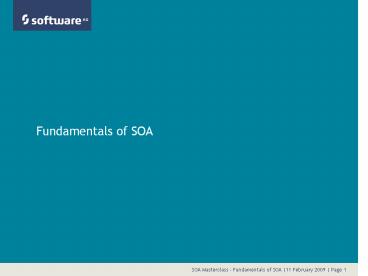Fundamentals of SOA - PowerPoint PPT Presentation
1 / 20
Title:
Fundamentals of SOA
Description:
Fundamentals of SOA Business flexibility depends on flexible IT Systems, processes and relationships Business Increasing desire for some business activities to change ... – PowerPoint PPT presentation
Number of Views:315
Avg rating:3.0/5.0
Title: Fundamentals of SOA
1
Fundamentals of SOA
2
Business flexibility depends on flexible
ITSystems, processes and relationships
- IT
- Shifting focus of enterprise automation
requirements - Support product and service differentiation
- Support management and strategy
- Align sourcing and spend with business
priorities
- Business
- Increasing desire for some business activities to
change direction rapidly - Desire for more flexible business models and
footprints - The freedom to innovateand involve others in
innovation
Source MWD
3
So what are we working with
IT Focus
1970
1990
1980
1960
4
The Philosophy of Services Oriented Architecture
(SOA)
- SOA is about building systems out of parts.
- Parts provide some business logic.
- Parts expose application and data operations.
- Parts should be loosely coupled.
IT Business share common view of business
process.
5
What is a service
6
SOA Defined
Service Oriented Architecture is a paradigm for
organizing and utilizing distributed capabilities
that may be under the control of different
ownership domains. It provides a uniform means to
offer, discover, interact with and use
capabilities to produce desired effects
consistent with measurable preconditions and
expectations. OASIS SOA Reference Model
Technical Committee
7
SOA Defined Part One
Service Oriented Architecture is a paradigm for
organizing and utilizing distributed capabilities
that may be under the control of different
ownership domains. It provides a uniform means to
offer, discover, interact with and use
capabilities to produce desired effects
consistent with measurable preconditions and
expectations. OASIS SOA Reference Model
Technical Committee
8
Stuff we need
1. Service Enablement
9
Technical Services
- Finely Grained
- Application Semantics
- Leave and Layer
- May include application processes
- Application platform providers
- Bottom up Cataloging
You already have these In your network Whether
you know it or not
Technical Services
10
Business Services
Requires deliberate design
- Coarsely Grained
- Business Semantics
- Enables Business Processes
- Top Down Decomposition
1
1
1
2
2
2
2
3
3
3
4
4
Business Services
Technical Services
11
SOA Defined Part Two
Service Oriented Architecture is a paradigm for
organizing and utilizing distributed capabilities
that may be under the control of different
ownership domains. It provides a uniform means to
offer, discover, interact with and use
capabilities to produce desired effects
consistent with measurable preconditions and
expectations. OASIS SOA Reference Model
Technical Committee
12
SOA Defined Part Three
Service Oriented Architecture is a paradigm for
organizing and utilizing distributed capabilities
that may be under the control of different
ownership domains. It provides a uniform means to
offer, discover, interact with and use
capabilities to produce desired effects
consistent with measurable preconditions and
expectations. OASIS SOA Reference Model
Technical Committee
13
Stuff we need
1. Service Enablement
2. Service Access/Interaction
3. Service Registry
14
Finding and Using Services
"SOA is a mess waiting to happen. By encouraging
widespread reuse of scattered software
components, SOA threatens to transform the
enterprise network into a complex, sprawling,
unmanageable mesh. Left ungoverned, SOA could
allow anyone anywhere to deploy a new service any
time they wish, and anyone anywhere to invoke and
orchestrate that service--and thousands of
othersinto ever more convoluted messaging
patterns." James Kobielus, principal analyst at
Current Analysis
SOA could allow anyone anywhere to deploy a new
service any time they wish, and anyone anywhere
to invoke and orchestrate that service
15
Interdependence Can Destroy Agility
How can you change anything once everything is
tied together?
16
The Dangers of Service Spaghetti
"SOA is a mess waiting to happen. By encouraging
widespread reuse of scattered software
components, SOA threatens to transform the
enterprise network into a complex, sprawling,
unmanageable mesh. Left ungoverned, SOA could
allow anyone anywhere to deploy a new service any
time they wish, and anyone anywhere to invoke and
orchestrate that service--and thousands of
othersinto ever more convoluted messaging
patterns." James Kobielus, principal analyst at
Current Analysis
complex, sprawling, unmanageable
17
Why all this complexity ?
18
Governance is key for SOA
lack of working governance mechanisms in
midsize-to-large (greater than 50 services)
post-pilot SOA projects will be the most common
reason for project failure Jess Thompson,
Research Director, Gartner
19
Stuff we need
1. Service Enablement
2. Service Access/Interaction
3. Service Registry
4. SOA Governance
20
Key applications

